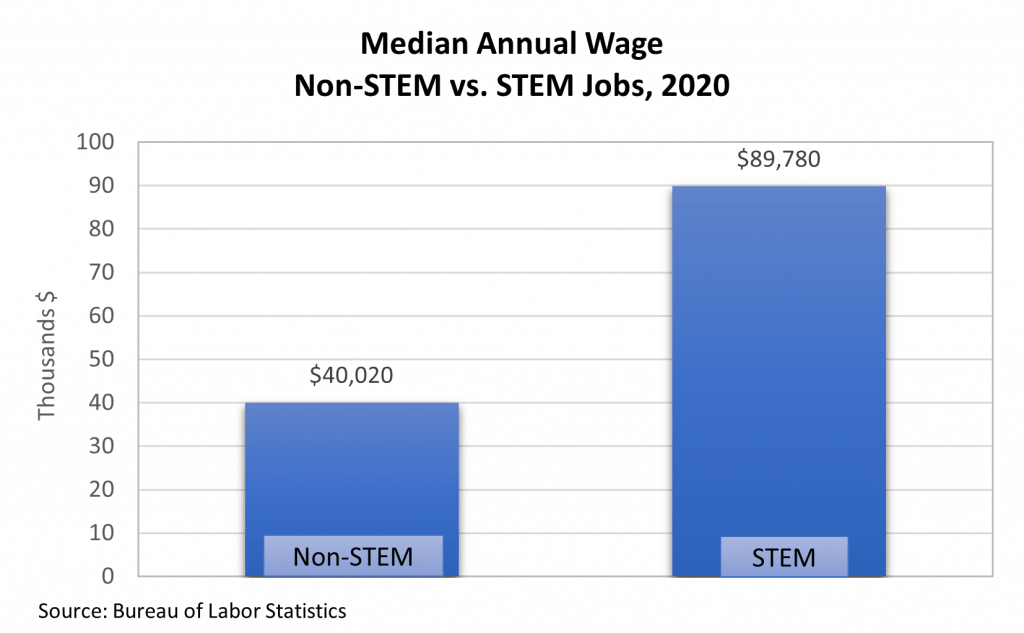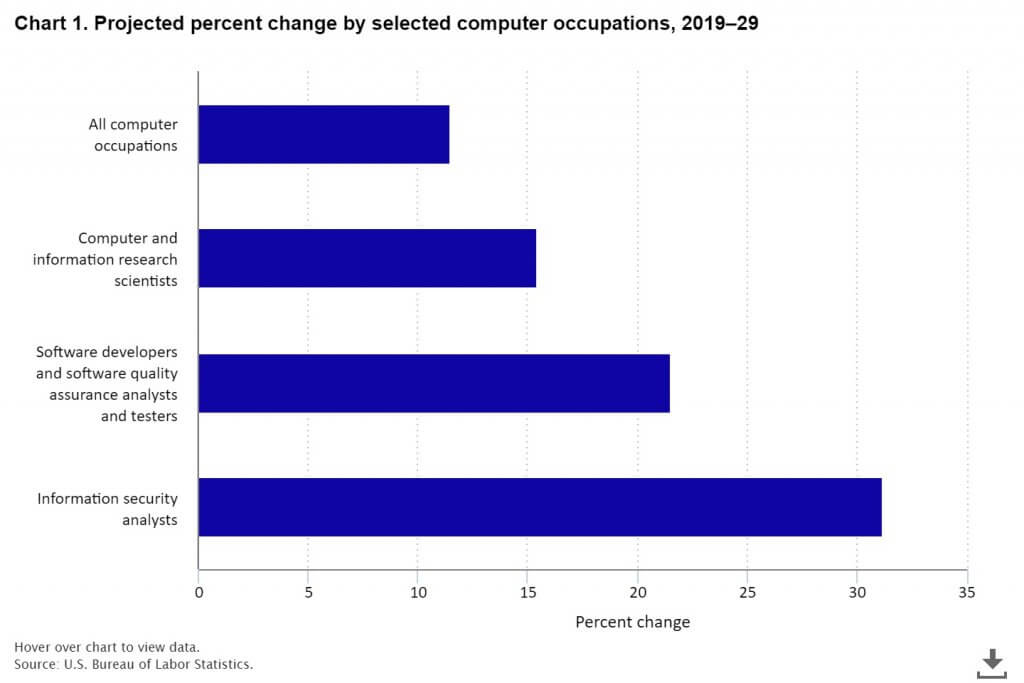Among the many benefits of homeschooling is the ability to thoroughly delve into your child’s interests. Time for favorite interests can be incorporated into a homeschool routine at any grade level, but electives take on an increased importance in the late middle and high school years.
Elective choices for homeschoolers can become a vehicle for college major and career decisions in addition to filling necessary state requirements for graduation. It’s a perfect and almost risk-free time to explore the possibilities!
Students who gravitate toward STEM (science, technology, engineering, and math) career interests will find a healthy job market with an expected growth rate of 10.5% over the next decade. Need another reason to encourage a STEM-based elective? Jobs in STEM earn more than twice as much as non-STEM occupations.

Recommended: STEM Education Statistics
Deciding to try a STEM elective is easy, but choosing among the countless possibilities is definitely more difficult. Luckily, homeschoolers have time to explore options or concentrate on a specific area. Let’s look at some STEM elective choices and resources.
Table of Contents
Engineering
Homeschoolers interested in engineering can begin their elective journey by reviewing online resources. TeachEngineering from the University of Colorado Boulder is an excellent place to start learning about types of engineers and for building an engineering curriculum for K-12 students.
TRYEngineering.org is a joint effort between IEEE (Institute of Electrical and Electronics Engineers), IBM, and the New York Hall of Science. The site features more than 130 free or low-cost engineering lesson plans for specific age ranges. Students can also access engineering games and explore competitions, research opportunities, internships, and scholarships.
High school students can find an endless selection of online engineering courses and textbooks from MIT OpenCourseWare, an initiative of the Massachusetts Institute of Technology. Educational materials from its undergraduate and graduate-level courses are available online, free of charge. Engineering courses include aerospace, chemical, electrical, environmental, nuclear, ocean, and systems, among many others.
Robotics

Caught somewhere in between the disciplines of engineering and computer programming, robotics has surged in popularity among students and may well be on your homeschooler’s elective wish-list. Robotics introduces kids to coding, prepares them for the future, and encourages creativity. Robotics clubs and in-person classes can be a great opportunity for students to improve collaboration skills. Joining a robotics team could also fill that STEM elective. First Robotics is a popular resource for competitions with over 4,000 teams worldwide. Join an existing team or start one for your homeschool group.
The Queensland University of Technology’ Robot Academy offers short video lessons and full courses dedicated to robotics. The content is university-level and can be accessed at no cost. Likewise, MIT OpenCourseWare lists an impressive list of free, online courses, from Introduction to Robotics to a Lego-based project class.
Computer Programming
Careers in information systems continue to be among the highest growth and pay of all STEM-related occupations. Notably, jobs in cybersecurity alone are expected to grow 33% in the next decade with a $103,000 median income. Non-programming jobs such as data analysts, artists, scientists, and engineers also incorporate programming into their work. A background in coding is sure to give your homeschooler an advantage in college and contribute to career success. Fortunately, there are a host of opportunities to add computer science as an elective.

Code.org is a non-profit dedicated to expanding the knowledge of computer science. Its website has hundreds of courses and activities by grade level. Sixty-one million students have learned on Code.org.
Khan Academy is a resource familiar to homeschoolers. Khan Academy offers courses in JavaScript, Processing JS, HTML & CSS, HTML, JavaScript, and SQL. It’s an excellent way to see if programming is a good fit for your homeschooler.
If coding sparks your student’s elective interests, online classes provide the next step in building comprehensive knowledge. Middle school students can be introduced to text-based coding with Python, a powerful language used for everything from web development to data science. High school students can explore topics like web development, artificial intelligence, and software engineering. An internship is also an excellent way to earn elective credits all while preparing for college and careers. CodeWizardsHQ offers its high school graduates a coding internship to work with a non-profit organization creating resume-worthy projects that will stand out to colleges and employers.
Forensic Science
Forensic science, the art of criminal investigation, combines physics, chemistry, and sometimes good old-fashioned mystery and is sure to intrigue even the most reluctant STEM student. High school students can find free and low cost online courses from FutureLearn, a British digital education platform jointly owned by The Open University and SEEK Ltd.
Recommended: STEM Classes for Kids
Math

Math courses are generally considered to be core classes, but for students interested in exploring math topics as electives there are a number of good choices that not only fill requirements, but are preparations for college and careers as well as enhancing life skills.
Statistics is a perfect complement for students interested in business, social sciences, and the humanities. Statistics is important in data collection and analysis in any field. A number of online resources are available for studying statistics. Khan Academy and Stanford University both have free options for introductory statistics classes. There are also numerous textbooks available, some tailored specifically for homeschool students.
With a median pay of over $73,000 annually and a healthy job growth forecast, accounting could be well worth exploring. Auditing a college-level class from EdX, a nonprofit created by Harvard and MIT, is an online option for beginning accounting. Khan Academy and Alison offer college-level courses free of charge.
Finance and especially personal finance can provide essential life skills for new graduates. Financial literacy courses include money-management such as saving, investing, and budgeting as well as explaining how debt and interest work. Students can find a comprehensive personal finance curriculum from The Actuarial Foundation. With their Building Your Future program, high school students study the essentials of personal finance with a handy series of workbooks for students and teachers.
Health Sciences
A student interested in pursuing a career in a health-related occupation could benefit from an elective course in medical terminology. Des Moines University offers a free course available online. Students can also check out EdX, the nonprofit from Harvard and MIT, for a variety of health classes including human anatomy and food, nutrition, and health.
Courses in CPR or first aid might check the elective box and provide valuable life skills as well. The Red Cross offers in-person and online classes for these and many other health-related topics including many that could lead to a first job, like babysitting and lifeguarding.
Building Valuable Skills
Adding STEM-based electives can open a world of options for your student. Electives can be accomplished at home, online, through co-ops, field trips, or dual enrollment at a local college. Whether your child studies a STEM elective to develop an existing interest or to try something completely new, building these valuable 21st century skills will prepare them for college and careers in whatever field that they choose.
